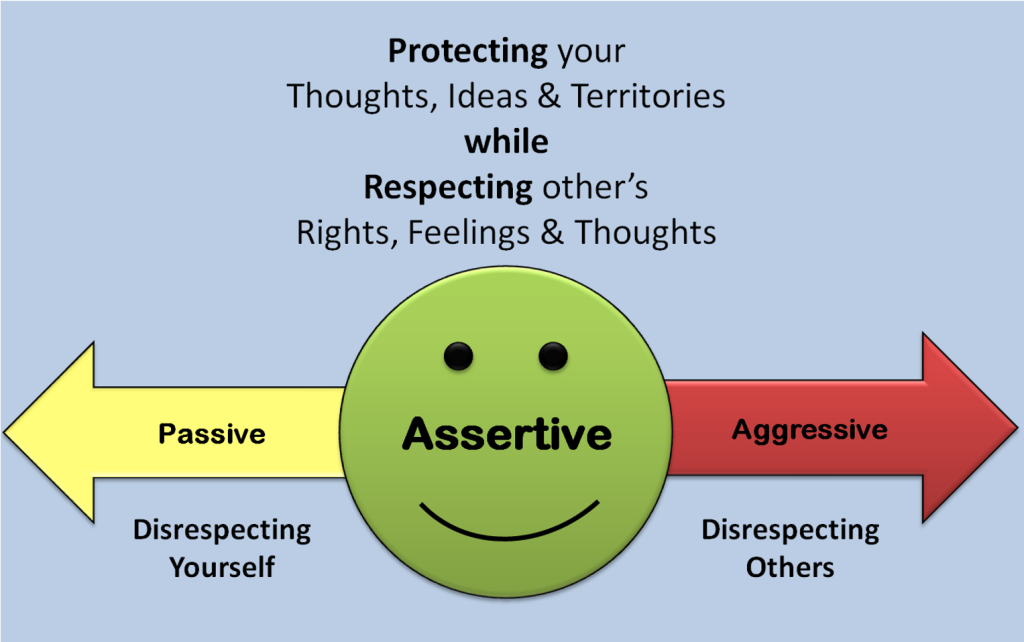Many of us struggle with expressing our needs, opinions and boundaries in relationships, whether personal or professional. In my therapeutic practice, I regularly work with clients who feel unheard, taken advantage of or guilty when they try to advocate for themselves. Developing assertiveness skills empowers people to express themselves authentically whilst preserving, nurturing or even enhancing important relationships.
Understanding assertiveness vs. the other communication styles
To develop effective assertiveness skills, it's helpful to understand how assertive communication differs from other styles:
Passive Communication
Passive communicators often suppress their own needs and opinions to avoid conflict. They may agree to things they don't want to do, struggle to say no and frequently feel resentful. While this style might seem peaceful, it often leads to internal frustration and one-sided relationships.
Aggressive Communication
Aggressive communicators express their needs but often at the expense of others. They may use demanding language, interrupt others and show little consideration for different viewpoints. This style might get immediate results but damages relationships over time.
Passive-Aggressive Communication
This indirect style involves expressing dissatisfaction by making the point in an indirect way, such as sulking, sarcasm or subtle sabotage rather than direct communication. It's often a response to feeling unable to express needs directly.
Assertive Communication
Assertiveness skills enable us to express our thoughts, feelings and needs clearly and respectfully. Assertive communicators can advocate for themselves whilst considering others' perspectives and maintaining integrity in the relationship.

Common Barriers to Developing Assertiveness Skills
Many people struggle with assertiveness due to learned patterns or misconceptions:
Fear of Conflict
Some people avoid assertive communication because they fear it will create conflict. However, avoiding difficult conversations often creates more problems than addressing issues directly and respectfully.
People-Pleasing Tendencies
Those with strong people-pleasing patterns may feel guilty or selfish when expressing their needs. Learning assertiveness skills involves recognising that your needs are as valid as others'.
Cultural or Family Messages
Some families or cultures discourage direct communication, particularly around authority figures or certain topics. Developing assertiveness skills means finding ways to honour your background whilst advocating for yourself.
Low Self-Worth
People who struggle with self-esteem may feel they don't deserve to have their needs met or their opinions heard. Building assertiveness skills often goes hand-in-hand with developing self-worth.
Essential Assertiveness Skills
Using "I" Statements
One of the most fundamental assertiveness skills is expressing yourself using "I" statements rather than "you" statements. This reduces defensiveness and focuses on your experience:
- Instead of: "You never listen to me"
- Try: "I feel unheard when I'm interrupted"
Setting Clear Boundaries
Healthy boundaries are essential for assertive communication. This involves being clear about what you will and won't accept:
- "I'm not comfortable discussing that topic"
- "I need some time to think about this before responding"
- "I'm not available to work late tonight"
Learning to Say ‘No’
Perhaps the most challenging of all assertiveness skills, saying no requires practice and self-compassion. Remember that saying no to one thing often means saying yes to something more important:
- "I won't be able to take on that project right now"
- "That doesn't work for me, but thank you for thinking of me"
- "I've already committed to something else that evening"
Asking for What You Need
Many people assume others should know what they need without being told. Developing assertiveness skills means taking responsibility for clearly communicating your needs:
- "I'd appreciate some help with this"
- "I need some quiet time when I first get home from work"
- "Could we schedule a time to discuss this properly?"
Practising Assertiveness Skills in Different Contexts
Workplace Assertiveness
Professional environments often require particular assertiveness skills:
- Requesting feedback on your performance
- Advocating for resources or support you need
- Addressing workplace conflicts directly but professionally
- Negotiating workload or responsibilities
Family Relationships
Family dynamics can make assertiveness challenging, but these skills are often most needed with those closest to us:
- Expressing different opinions from family members
- Setting boundaries around visits or involvement
- Addressing long-standing family patterns
- Advocating for your own family unit's needs
Friendships
Assertiveness skills in friendships involve maintaining equality and mutual respect:
- Expressing when you feel unsupported
- Suggesting activities you'd prefer
- Addressing behaviour that affects the friendship
- Being honest about your availability or capacity
The Physical Aspects of Assertiveness Skills
Body language plays a crucial role in assertive communication:
- Maintain appropriate eye contact
- Stand or sit with confident posture
- Keep your voice steady and clear
- Use open body language rather than defensive gestures
These physical elements support your verbal assertiveness skills and help others take your communication seriously.
Overcoming Guilt and Building Confidence
Many people experience guilt when they first practice assertiveness skills. This is normal and often indicates you're challenging old patterns. Remember:
- Your needs and opinions are valid
- Healthy relationships can withstand honest communication
- Assertiveness often improves relationships by reducing resentment
- You're not responsible for others' emotional reactions to your boundaries
Responding to Pushback
When you begin using assertiveness skills, some people may resist the change. They might be accustomed to your passive communication style and feel uncomfortable with your new directness. Common responses include:
- Calling you "selfish" or "difficult"
- Increasing pressure when you set boundaries
- Guilt-tripping or emotional manipulation
These responses often indicate that your assertiveness skills are working - you're no longer enabling unhealthy patterns.
Building Assertiveness Skills Gradually
Developing assertiveness skills is a process that takes time and practice:
- Start small: Practice with low-stakes situations before tackling major issues
- Prepare in advance: Think about what you want to say and how you'll say it
- Practice self-care: Assertive communication can be emotionally draining initially
- Seek support: Consider working with a therapist or joining a support group
- Celebrate progress: Acknowledge your efforts even when conversations don't go perfectly

The Long-term Benefits
Developing assertiveness skills creates positive changes that extend throughout your life:
- Reduced resentment and improved relationships
- Increased self-respect and confidence
- Better work-life balance
- More authentic connections with others
- Decreased anxiety around social situations
Learning assertiveness skills is about expressing who you truly are with confidence and respect. These skills enable you to participate fully in your relationships and advocate for the life you want to live.
Remember, assertiveness is a skill that improves with practice. Be patient with yourself as you develop these new ways of communicating, and celebrate each step towards finding and using your authentic voice.

